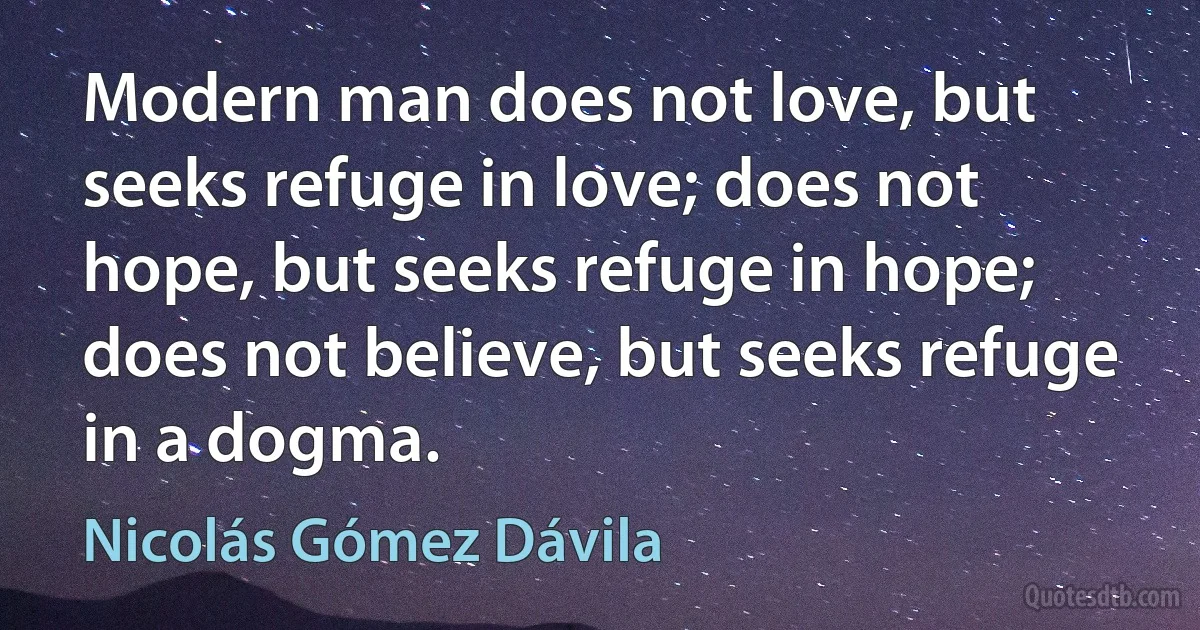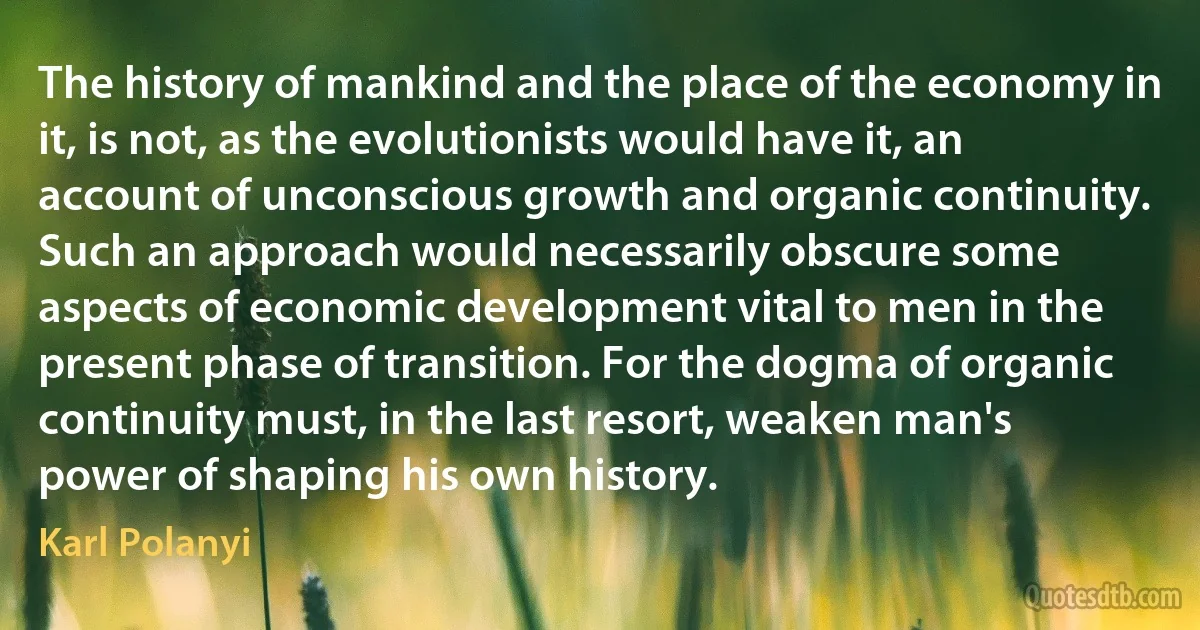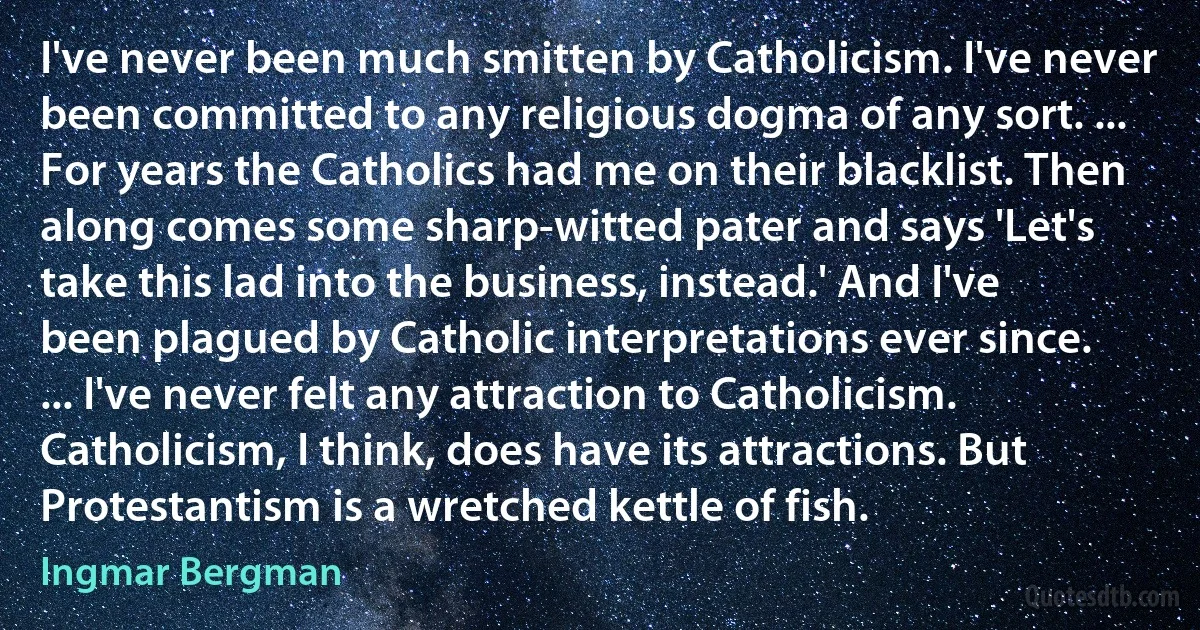Dogma Quotes - page 12
Trouble arises when either science or religion claims universal jurisdiction, when either religious dogma or scientific dogma claims to be infallible. Religious creationists and scientific materialists are equally dogmatic and insensitive. By their arrogance they bring both science and religion into disrepute. The media exaggerate their numbers and importance. The media rarely mention the fact that the great majority of religious people belong to moderate denominations that treat science with respect, or the fact that the great majority of scientists treat religion with respect so long as religion does not claim jurisdiction over scientific questions.

Freeman Dyson
The masses are always paralyzed by inertia. They resist change except in small doses which do not violently upset their current dogma and their comfort level. And that is why there must be many levels to the resistance. The masses must be fed milk before they are ready to digest meat, i.e., the brutal and unpleasant truth.

David Lane (white nationalist)
Goodness is not the pursuit of conformity. If you conform to a belief, to a concept, to an idea, to a principle, that is not good, because it creates conflict. Goodness cannot flower through another, through a religious figure, through dogma, through belief; it can only flower in the soil of total attention in which there is no authority. The essence of goodness is a mind that is not in conflict. And goodness implies great responsibility. You can't be good and allow wars to take place. So a person who is really good is totally responsible for his whole life.

Jiddu Krishnamurti
What we need in literature today are vast philosophic horizons - horizons seen from mastheads, from airplanes; we need the most ultimate, the most fearsome, the most fearless "Why?" and "What next?"
This is what children ask. But then children are the boldest philosophers. They enter life naked, not covered by the smallest fig leaf of dogma, absolutes, creeds. This is why every question they ask is so absurdly naive and so frighteningly complex. The new men entering life today are as naked and fearless as children; and they, too, like children, like Schopenhauer, Dostoevsky, Nietzsche, ask "Why?" and "What next?" Philosophers of genius, children, and the people are equally wise - because they ask equally foolish questions. Foolish to a civilized man who has a well-furnished European apartment with an excellent toilet and a well-furnished dogma.

Yevgeny Zamyatin
I find that quakerism and research science fit together very, very well. In quakerism you're expected to develop your own understanding of god from your experience in the world. There isn't a creed, there isn't a dogma. There's an understanding but nothing as formal as a dogma or creed and this idea that you develop your own understanding also means that you keep redeveloping your understanding as you get more experience, and it seems to me that's very like what goes on in "the scientific method." You have a model, of a star, its an understanding, and you develop that model in the light of experiments and observations, and so in both you're expected to evolve your thinking. Nothing is static, nothing is final, everything is held provisionally.

Jocelyn Bell Burnell
If only there were a dogma to believe in. Everything is contradictory, everything tangential; there are no certainties anywhere. Everything can be interpreted one way and then again interpreted in the opposite sense. The whole of history can be explained as development and progress and can also be seen as nothing but decadence and meaninglessness. Isn't there any truth? Is there no real and valid doctrine?"
The Master had never heard him speak so fervently. He walked on in silence for a little, then said, "There is truth, my boy. But the doctrine you desire, absolute, perfect dogma that alone provides wisdom, does not exist. Nor should you long for a perfect doctrine, my friend. Rather, you should long for the perfection of yourself. The deity is within you, not in ideas and books. Truth is lived, not taught. Be prepared for conflicts, Joseph Knecht - I can see they have already begun.

Hermann Hesse
I strongly recommend that all read the autobiography of St. Theresa. In spite of the fact that this work went through the "spiritual" censorship of the Church, some amazing pages have been preserved. By propagating the dogma of Jesus Christ as the only begotten Son of God, the Church contradicts the very sense of the prayer given to us by Jesus Christ himself, "Our Father which art in heaven." And also the words of the Scriptures, "So God created man in his own image." (Genesis 1:27) Thus, by claiming the exclusiveness of sonship and divine origin for Jesus Christ, the Church, by that very claim, forever divorced him from mankind. From this came a whole train of grave events; the exclusion of Jesus Christ from the life of humanity, the obliteration of his human Sacrifice and the awful suggestion implying that the death of Christ on the Cross saved humanity from "original" sin (?!) and from all subsequent sins.

Jesus Christ
Deeming the unsubstantiated dogma of a localized religious cult to be an undignified and unsuitable base on which to erect the chronology of galactic man, the members of this convention hereby declare that time shall now be reckoned from the year 2000 A.D. (Old System), which becomes the year 0. The revolution of Earth about Sol remains the standard annual unit.

Jack Vance
In the years between our defeat in 1979 and our defeat in 1983 Labour was increasingly seen to be a party slipping towards impossiblism, succumbing to fads, riven by vicious divisions, speaking the language of sloganised dogma – and usually voicing it in the accents of menace. It was almost as if sections of the party measured the purity of their socialism by the distance which they could put between it and the minds of the British people.

Neil Kinnock
Though Dogma and theology are always intimately related and can never be separated, yet they are never entirely of the same stuff. Dogma is a vast domain which theology will never wholly exploit. There is always infinitely more in Dogma, considered in its concrete totality, that is to say, in the very Object of divine revelation, than in this "human science of revelation", in this product of analysis and rational elaboration which theology always is. The latter, in its very truth, will always-and all the more in that it will always be rationally formulated-be inadequate for Dogma; for it is indeed the explanation of it, but not the fulness. This weakness is congenital. True theology knows that. It does not confuse the orders.

Henri de Lubac
[Alberto Knox] Spinoza belonged to the Jewish community of Amsterdam, but he was excommunicated for heresy. Few philosophers in more recent times have been so blasphemed and so persecuted for their ideas as this man. It happened because he criticized the established religion. He believed that Christianity and Judaism were only kept alive by rigid dogma and outer ritual. He was the first to apply what we call a historico-critical interpretation of the Bible.

Baruch Spinoza
That our modern natural sciences have become so thoroughly entangled in this Spinozistic dogma (most recently and worst of all, Darwinism with its incomprehensibly onesided doctrine of the "struggle for existence”) is probably due to the origins of most natural scientists: In this respect they belong to the "common people”; their ancestors were poor and undistinguished people who knew the difficulties of survival only too well at firsthand.

Baruch Spinoza
Spinoza believed that he had, through metaphysical inquiry, discovered important truths about God, nature and human beings, truths that led to principles of great consequence for our happiness and our emotional and physical flourishing. This, in fact, is what he called "true religion.” There is a lesson here: By enforcing conformity of belief and punishing deviations from dogma, religious authorities may end up depriving the devoted of the possibility of achieving in religion that which they most urgently seek.

Baruch Spinoza
Conservatives pride themselves on resisting change, which is as it should be. But intelligent deference to tradition and stability can evolve into intellectual sloth and moral fanaticism, as when conservatives simply decline to look up from dogma because the effort to raise their heads and reconsider is too great.
The laws concerning marijuana aren't exactly indefensible, because practically nothing is, and the thunderers who tell us to stay the course can always find one man or woman who, having taken marijuana, moved on to severe mental disorder.
But that argument, to quote myself, is on the order of saying that every rapist began by masturbating.
General rules based on individual victims are unwise.
And although there is a perfectly respectable case against using marijuana, the penalties imposed on those who reject that case, or who give way to weakness of resolution, are very difficult to defend.

William F. Buckley
When the Church says that, in the dogmas of religion, reason is totally incompetent and blind, and its use to be reprehended, this really attests the fact that these dogmas are allegorical in their nature, and are not to be judged by the standard which reason, taking all things sensu proprio, can alone apply. Now the absurdities of a dogma are just the mark and sign of what is allegorical and mythical in it. In the case under consideration, however, the absurdities spring from the fact that two such heterogeneous doctrines as those of the Old and New Testaments had to be combined. The great allegory was of gradual growth. Suggested by external and adventitious circumstances, it was developed by the interpretation put upon them, an interpretation in quiet touch with certain deep-lying truths only half realised. The allegory was finally completed by Augustine, who penetrated deepest into its meaning, and so was able to conceive it as a systematic whole and supply its defects.

Arthur Schopenhauer
Let them not flatter themselves if they think they have Scripture authority for their assertions, since the devil himself quoted Scripture, and the essence of the Scriptures is not the letter, but the meaning. Otherwise, if we follow the letter, we too can concoct a new dogma and assert that such persons as wear shoes and have two coats must not be received into the Church.

Jerome
The Declaration of Independence announces the sublime truth, that all power comes from the people. This was a denial, and the first denial of a nation, of the infamous dogma that God confers the right upon one man to govern others. It was the first grand assertion of the dignity of the human race. It declared the governed to be the source of power, and in fact denied the authority of any and all gods. Through the ages of slavery - through the weary centuries of the lash and chain, God was the acknowledged ruler of the world. To enthrone man, was to dethrone God.

Robert G. Ingersoll
While all of the countries of Indochina have been subjected to endless denunciations in the West for their 'loathsome' qualities and unaccountable failure to find humane solutions to their problems, Cambodia was a particular target of abuse. In fact, it became virtually a matter of dogma in the West that the regime was the very incarnation of evil with no redeeming qualities, and that the handful of demonic creatures who had somehow taken over the country were systematically massacring and starving the population.

Noam Chomsky
But it is quite easy to express the solution in words, thus: the plurality that we perceive is only an appearance; it is not real. Vedantic philosophy, in which this is a fundamental dogma, has sought to clarify it by a number of analogies, one of the most attractive being the many-faceted crystal which, while showing hundreds of little pictures of what is in reality a single existent object, does not really multiply the object...
'You may suddenly come to see, in a flash, the profound rightness of the basic conviction of Vedanta: ... knowledge, feeling and choice are essentially eternal and unchangeable and numerically one in all men, nay in all sentient beings.'

Erwin Schrödinger
The one case in which he referred to the "invisible hand" was that in which private persons preferred the home trade to the foreign trade, and he held that such preference was in the national interest, since it replaced two domestic capitals while the foreign trade replaced only one. The argument of the two capitals was a bad one, since it is the amount of capital that matters, not its subdivision; but the invisible sanction was given to a Protectionist idea, not for defence but for employment. It is not surprising that Smith was often quoted in Parliament in support of Protection. His background, like ours today, was private enterprise; but any dogma of non-intervention by government has to make heavy weather in The Wealth of Nations.

Adam Smith



